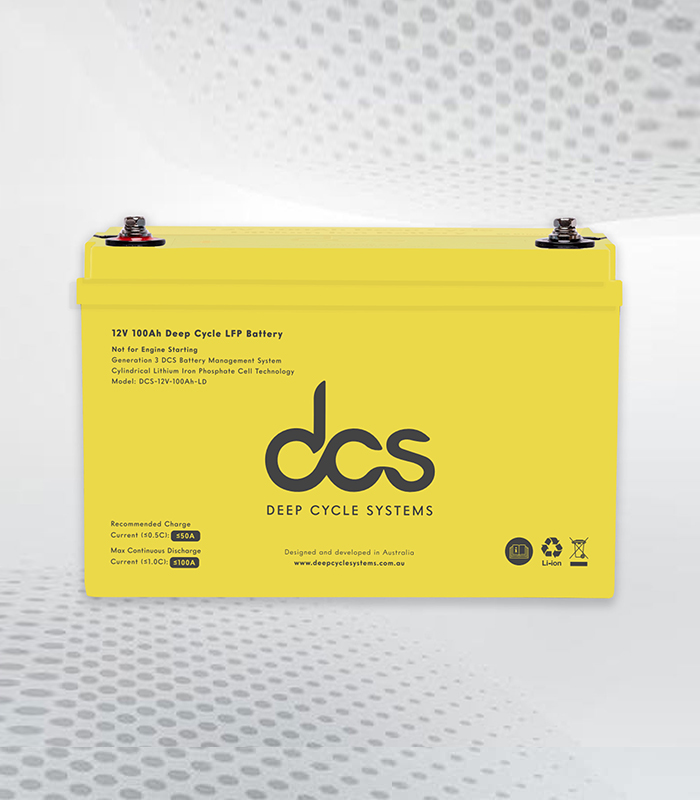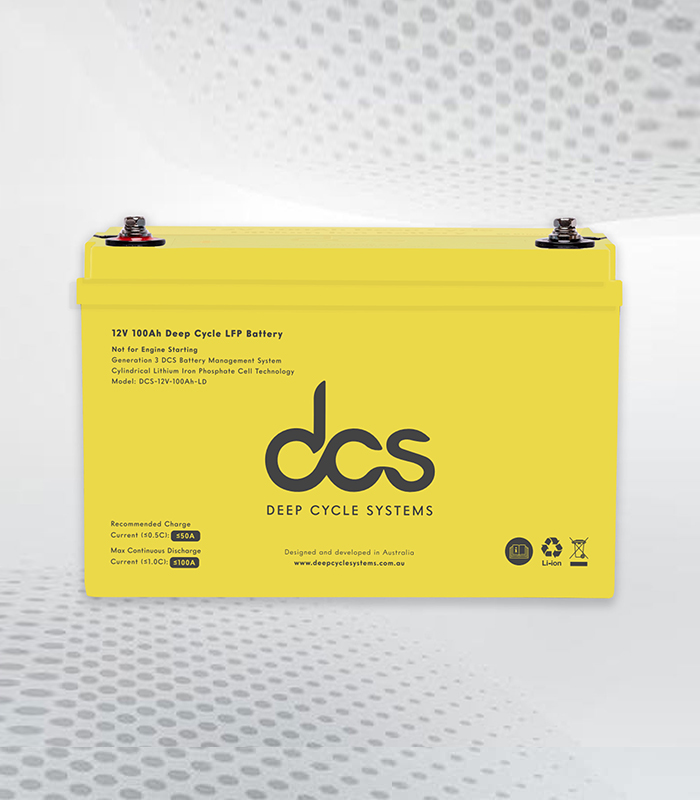In the ever-evolving world of technology, the need for efficient and powerful energy storage solutions has never been greater. Enter the Li Ion Battery 100ah– a game-changer in the realm of power storage. This cutting-edge battery technology is revolutionising the way we think about energy storage and is poised to shape the future of power consumption.
Understanding the 100ah Lithium Ion Battery
The 100ah Lithium Ion Battery represents a significant advancement in rechargeable battery technology, utilising lithium ions as a fundamental component in its electrochemical reaction. The term “100Ah” delineates its capacity, indicating its ability to deliver a current of 1 ampere over duration of 100 hours.
Such capacity is integral for devices and systems requiring sustained power, encompassing electric vehicles, solar power storage solutions, and an array of portable electronic gadgets. The principle behind its operation involves the movement of lithium ions between the cathode and anode during charge and discharge cycles. This process is highly efficient, contributing to the battery’s superior energy density and longevity compared to older battery technologies.
Furthermore, its ability to maintain a steady voltage level across a wide range of charge states adds to its appeal for high-demand applications. The adaptability of the 100-ah Lithium Ion Battery, underpinned by its rechargeable nature, makes it an essential component in modern energy storage strategies, heralding a new era in how power is stored and utilised across various sectors.
 The Benefits of Adopting 100Ah Lithium Ion Batteries
The Benefits of Adopting 100Ah Lithium Ion Batteries
The adoption of 100Ah lithium-ion batteries brings a plethora of advantages that are instrumental in propelling forward the realms of energy storage and power supply. These batteries are distinguished by their remarkable energy density, which allows for a substantial amount of energy to be stored in a compact and lightweight form. This characteristic is particularly advantageous for portable applications where space and weight are critical considerations.
Furthermore, these batteries boast an impressive cycle life, capable of enduring numerous charge and discharge cycles while maintaining their efficiency. This trait not only enhances their longevity but also underscores their cost-effectiveness, as the need for frequent replacements is significantly reduced. Their resilience and reliability are bolstered by their ability to sustain consistent performance across a wide range of temperatures, making them suitable for diverse environments and applications.
An additional benefit lies in the quick charging capability of 100Ah lithium-ion batteries, which ensures that devices and systems can be rapidly powered, thus minimising downtime and enhancing productivity. They also exhibit a low self-discharge rate, which is pivotal for maintaining charge over extended periods when not in use.
Equally important is the environmental aspect; these batteries contribute to a reduction in waste and pollution by circumventing the necessity for disposable batteries, thereby fostering a more sustainable approach to power usage and storage. With these benefits, 100Ah lithium-ion batteries not only offer a superior alternative to traditional power storage solutions but also align with the growing emphasis on efficiency and environmental responsibility.
A Range of Applications for the 100-ah Lithium Ion Battery
The adaptability of the 100-ah Lithium Ion Battery extends to an impressive array of applications, underscoring its pivotal role in modern energy solutions. Electric vehicles (EVs) benefit immensely from these batteries, where their high energy density translates to longer driving ranges and shorter charging times, essential for EV user satisfaction and adoption rates. Similarly, in renewable energy sectors such as solar and wind, the 100-ah Lithium Ion Battery is indispensable for energy storage systems. It ensures the reliability of supply by storing excess energy generated during peak production times for use during demand peaks or low production periods.
Moreover, these batteries are integral in providing backup power for critical infrastructure, including telecommunications networks and medical facilities, where power reliability can be a matter of life and death. The portability and efficiency of 100Ah lithium ion batteries also make them ideal for powering a wide range of portable electronic devices, from heavy-duty tools to camping equipment, offering convenience and reliability for users on the move.
In areas beyond the reach of traditional power grids, these batteries offer a lifeline, powering off-grid homes and remote locations, thus facilitating access to electricity for underserved communities. The broad applicability of the 100-ah Lithium Ion Battery across these diverse fields not only highlights its versatility but also its contribution towards innovative, sustainable energy solutions that meet the demands of various sectors.
Sustainability and Environmental Impact
The arrival of 100Ah lithium ion batteries represents a significant step towards more environmentally friendly energy storage solutions. These batteries provide a greener alternative to their lead-acid counterparts, mainly due to their longer lifespan and rechargeable nature, which significantly reduces the environmental impact associated with frequent battery replacements and disposal.
The production process of lithium ion batteries, while still impactful, is continuously being refined to minimize harmful emissions and resource extraction, demonstrating an industry-wide commitment to reducing environmental footprints. Additionally, the efficiency of these batteries in storing renewable energy from sources such as solar and wind contributes to the reduction of reliance on fossil fuels, further aligning with global sustainability goals.
However, it is essential to recognize the importance of responsible sourcing of lithium and other minerals used in these batteries, as well as the development of more efficient recycling methods to ensure the lifecycle of the batteries minimizes environmental impact. These efforts are crucial in ensuring that the benefits of 100Ah lithium ion batteries extend beyond their technical and economic advantages, contributing positively to environmental sustainability and the promotion of a cleaner, greener future in energy storage.
Challenges and Considerations in Adopting 100Ah Lithium Ion Batteries
Adopting 100Ah lithium ion batteries, whilst heralding numerous advantages, does present several challenges that warrant attention. The safety concerns associated with these batteries cannot be understated; they possess a risk of thermal runaway, a condition where increasing temperature leads to further increases in temperature, potentially leading to combustion. Proper management and safety protocols are imperative to mitigate such risks, necessitating advanced monitoring systems and protective measures to ensure safe usage.
Additionally, the initial investment required for 100-ah Lithium Ion Battery systems is relatively high, which may deter potential adopters. Whilst the long-term benefits often justify the upfront costs through reduced operational expenses and less frequent replacements, the initial outlay can be a significant barrier for small businesses and individuals.
The availability and sourcing of lithium and other critical minerals required for battery production also pose considerable challenges. The growing demand for these materials has raised concerns about sustainability, potential supply bottlenecks, and geopolitical implications of mining activities. Efforts to find alternative materials and improve recycling processes are underway but remain in their infancy.
Another consideration is the current infrastructure, which may not always be conducive to the widespread adoption of lithium ion batteries. For instance, the charging infrastructure for electric vehicles, a major application of these batteries, is still under development in many regions, which could slow down the transition to electric mobility.
In addressing these challenges, stakeholders must collaborate to enhance safety protocols, reduce costs, ensure sustainable material sourcing, and develop supportive infrastructures, paving the way for broader acceptance and utilisation of 100Ah lithium ion batteries.
The Future of 100Ah Lithium Ion Batteries
As advancements in battery technology forge ahead, the trajectory for 100Ah lithium ion batteries is set towards unparalleled improvements in efficiency, capacity, and sustainability. The industry’s relentless pursuit of innovation is likely to yield breakthroughs in material science, promising the development of batteries that are not only more powerful but also less reliant on scarce resources.
The exploration of alternative materials such as silicon or sulphur as substitutes for lithium could revolutionise battery capacity and reduce environmental impact. Furthermore, advancements in solid-state technology may enhance safety by eliminating the flammable liquid electrolyte present in current lithium ion batteries, offering a solution to one of the most significant challenges faced by this technology.
The integration of smarter, AI-driven battery management systems is on the horizon, poised to optimise charging cycles and extend battery life significantly. These systems will also facilitate the integration of 100Ah lithium ion batteries into smart grids, enabling more efficient energy use and further embedding these batteries into the fabric of future energy solutions. As the global push for green energy continues, the role of 100Ah lithium ion batteries in storing and dispatching renewable energy will become ever more critical, cementing their status as a cornerstone of the transition to a more sustainable energy landscape.
Maximising Efficiency with 100Ah Lithium Ion Batteries
To optimise the performance and longevity of 100Ah lithium ion batteries, it is crucial to employ strategic management and operational practices. Implementing advanced battery management systems can significantly enhance efficiency by monitoring the battery’s state of charge and health in real-time, thereby preventing overcharging or deep discharging, which can detrimentally affect the battery’s lifespan.
Additionally, adhering to the manufacturer’s recommended charging protocols ensures that the battery is charged in a manner that maximises its capacity and cycle life. Regular maintenance checks are also essential; keeping the battery terminals clean and ensuring that the battery is stored in a cool, dry place when not in use can prevent capacity loss. Moreover, optimising charging and discharging patterns according to application-specific requirements can further extend the battery’s effective service life.
By adopting these practices, users can ensure that their 100Ah lithium ion batteries operate at peak efficiency, delivering reliable power whilst minimising environmental impact.
FAQs
1. **Are 100Ah lithium-ion batteries safe for daily operations?**
Indeed, 100Ah lithium-ion batteries are considered safe for a variety of uses, provided that the manufacturer’s instructions regarding their charging, discharging, and storage are strictly followed. It is crucial to use appropriate protective measures and monitoring systems to prevent potential hazards, such as thermal runaway. Ensuring that these batteries are operated within their specified parameters significantly reduces safety risks, making them a reliable choice for various applications.
2. **What duration of service can be expected from a 100Ah lithium-ion battery?**
The service life of a 100Ah lithium-ion battery is influenced by several factors, including the frequency of its usage, the conditions under which it operates, and the maintenance practices followed. With careful attention, including observing optimal charging cycles and avoiding exposure to extreme conditions, these batteries can provide dependable service for several years. It is important to note that consistent monitoring and maintenance can significantly enhance their longevity, ensuring that they remain a durable option for energy storage needs.
Conclusion
The emergence of the 100Ah lithium-ion battery marks a significant leap towards redefining energy storage paradigms. Its superior energy density, extended lifespan, and broad applicability underscore its potential to spearhead advancements in power consumption and storage. As the energy sector evolves, the importance of such innovations becomes increasingly critical, offering a glimpse into a future where efficient and sustainable energy solutions are paramount. Despite the hurdles that accompany the adoption of new technologies, including safety concerns, initial costs, and material sourcing challenges, the trajectory of the 100Ah lithium-ion battery is overwhelmingly positive. Continued advancements in battery technology, coupled with a concerted effort to address these challenges, are essential in realising the full potential of these batteries.
| Other Good Articles to Read |
| Blogs Rain |
| Cme Blog Spot |
| Garcias Blogs |
| Yyc Blogs |
| Guiade Blogs |
| Blogs-Hunt |
| Impact-Blog |
| Smarty Blogs |
| Ed Blog |
| Mo Blogs |
| Blogs Em |
| Blogs T |
| Related Business Listings |
| Directory Submissions |
| Regional Directory |



